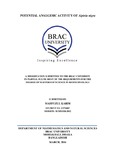Potential analgesic activity of Alpinia nigra

View/
Date
2016-03Publisher
BRAC UniversityAuthor
Karim, MahfuzulMetadata
Show full item recordAbstract
Alpinia nigra, a plant of Zingiberaceae family, content many important medicinal
compounds was studied in three experimental models of nociception. The analgesic
activity of crude extracts of acetone-ethanol (1:1) of root, shoot and leaf ware evaluated
by using acetic acid induced writhing method, formalin induced licking test and hot plate
test on Swiss albino mice. In acetic acid induced writhing test, the root extract of Alpinia
nigra at the doses of 200 mg/kg and 400 mg/kg body weight exhibited 58.2% and 62.2 %
inhibition respectively. The shoot extract shows 53.8% inhibition at 200 mg/kg/dose and
60.7% inhibition at 400 mg/kg/dose. Whereas the leaf extract produced 44.0% inhibition
at 200 mg/kg/dose and 50.7% inhibition at 400 mg/kg/dose. Morphine 5 mg/kg/dose
used as positive control and exhibited 76.0% inhibition compare to control. Alpinia
nigra caused a significant dose dependent inhibition of both the early (neurological, 0-5
min) and late (inflammatory, 15-30 min) phase of formalin induced licking. However, its
antinociceptive effects were more pronounced against the late phase of this model of
pain. The calculated licking response inhibitory effect of late phase for root, shoot and
leaf were 89.4%, 84.2% and 90.9% at the dose of 200 mg/kg respectively. For 400
mg/kg/dose, licking response inhibition of root, leaf and shoot was 94.8%, 88.3% and
92.2% respectively in late phase. Morphine at the dose of 5 mg/kg per body weight
exhibit licking response inhibition 99.2% in late phase. In hot plate test root extract at the
dose of 200 mg/kg and 400 mg/kg showed significant increase in the percentage of
tolerance time (pain reaction time). The peak effect was seen at 60 minutes, 77.3% and
46.5% of tolerance for 400 mg/kg/dose and 200 mg/kg/dose respectively as comparable
to 82.1% at 60 minutes obtained from morphine (5 mg/kg/dose). But leaf extract showed
tolerance time 59.1% and 52.2% at 60 minutes for 200 mg/kg and 400 mg/kg
respectively. The results of the present study indicate that Alpinia nigra has significant
analgesic potential, suggesting for the use of this plant for medicinal purposes and may
be employed for further investigations.
